The Crucial BX200 (480GB & 960GB) SSD Review: Crucial's First TLC NAND SSD
by Billy Tallis on November 3, 2015 9:00 AM ESTRandom Read Performance
Our random read performance test is conducted on a full drive and tests queue depths from 1 to 32. We focus primarily on the lower queue depths that are typical of interactive use, but also look at how the performance and power scales to more intensive loads. For desktop use, searching and virus scanning are typically the biggest sources of random reads, and they can exercise some of the larger queue depths. When working on a fragmented filesystem or with lots of small files, random I/O performance (especially for low queue depths) comes into play.
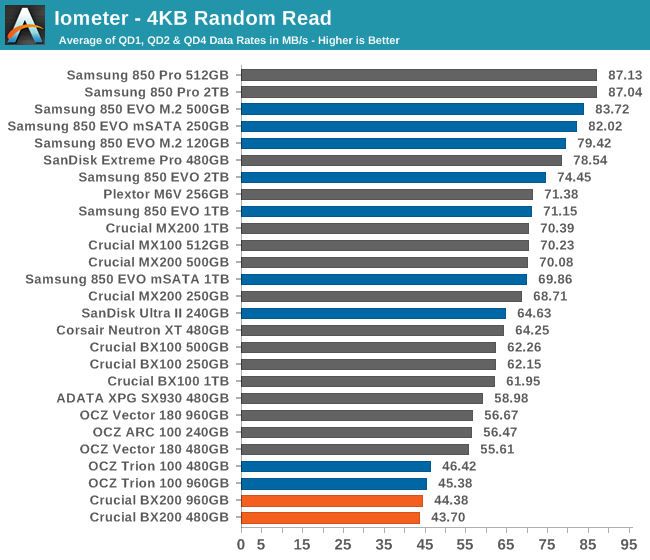
Random reads are slow, but at least the BX200 has company. This is what slow TLC flash does, but unlike many other results so far, this performance is not cause for major concern.
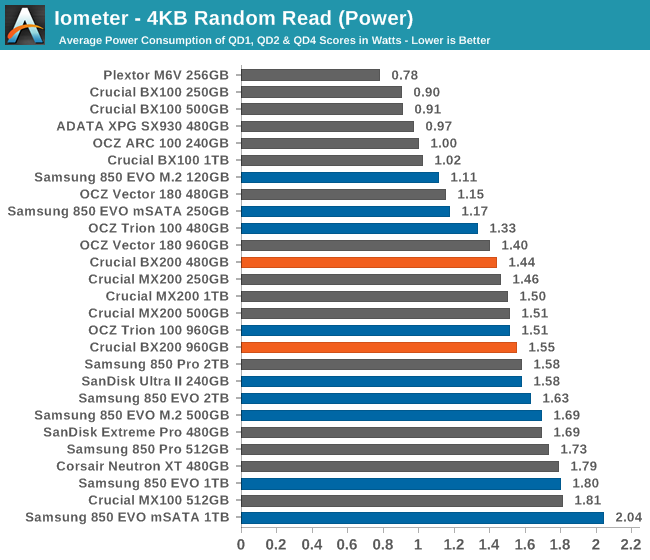
Power consumption is in the middle of the pack, so the BX200 is doing something (almost) right when handling reads.
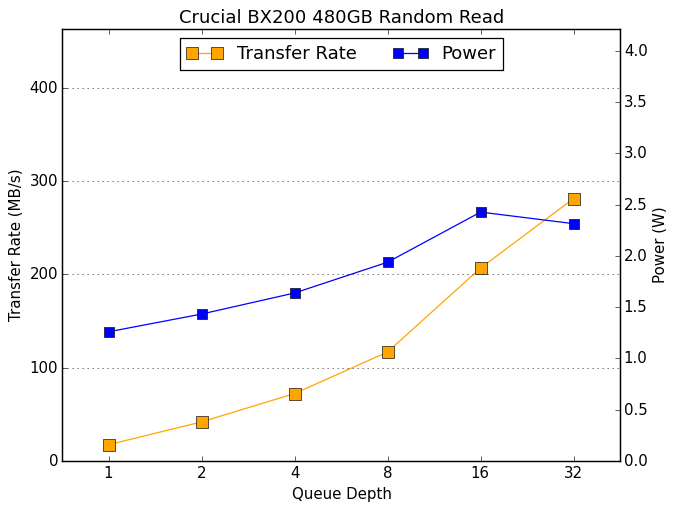 |
|||||||||
| Default | |||||||||
Performance scales smoothly as queue depth increases but it still starts low and never reaches very high.
Random Write Performance
The random write test is confined to a 16GB portion of the drive, which is otherwise empty and fresh from a secure erase. This gives the drive the chance to demonstrate much higher performance than on our performance consistency test that fills the drive. Tasks like installing software updates can modify a lot of files, but aren't hitting the entire disk. Random writes to the entire disk are usually found only in enterprise workloads such as large databases.
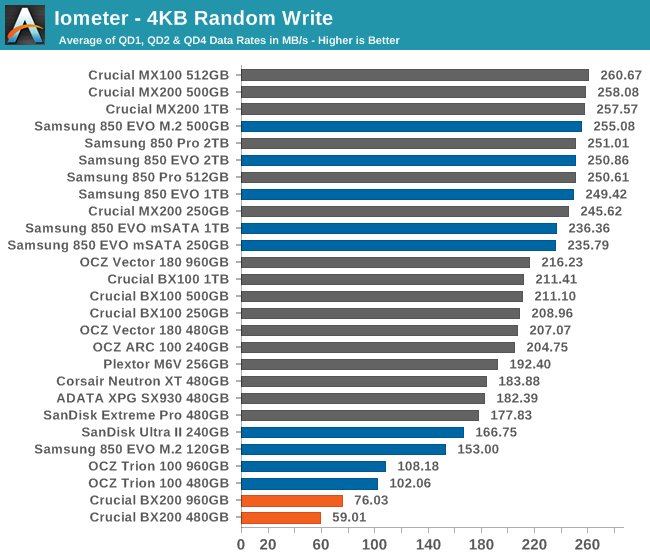
Our Iometer tests run for three minutes at each queue depth, so within 9 minutes the BX200 is clearly having trouble. The higher capacity of the the 960GB drive seems to help a lot, which suggests that the 240GB BX200's performance might be much worse than that of the 480GB.
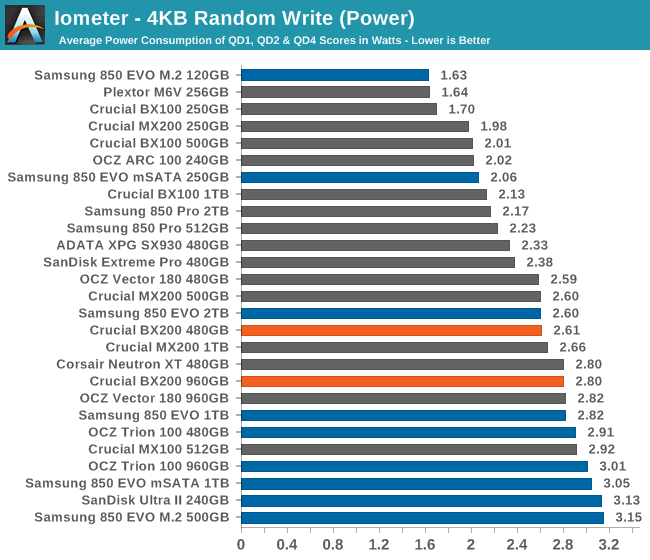
Power consumption is normal for a TLC drive, which suggests that there are a lot of background writes being done by the drive that are keeping power consumption up in spite of how little real work is getting done.
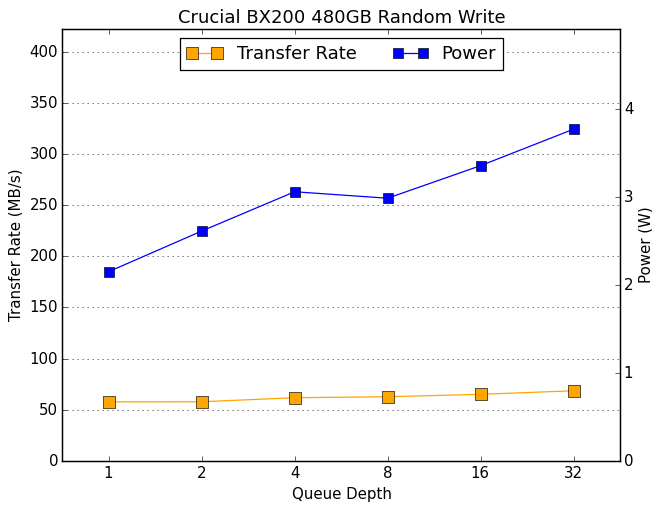 |
|||||||||
| Default | |||||||||
Random write performance hardly scales at all with increased queue depth, which is very uncommon but we have seen similar behavior from the OCZ Trion 100. Power consumption does increase dramatically, so the drive is clearly mismanaging the load of heavy writes.










85 Comments
View All Comments
redzo - Wednesday, November 4, 2015 - link
It's a disaster. I think that Crucial was better of not releasing the damn thing. What were they thinking? The performance gap is huge compared to samsung's evo. This product just shows that samsung rules TLC. All educated buyers will think twice before purchasing it even at 15/20$ lower than this.KAlmquist - Wednesday, November 4, 2015 - link
What makes it a disaster is that Crucial is replacing a successful product (the BX100) with this thing. Keep the BX100 around, give the new drive a designation like AX100, market it as a budget alternative to the BX100, and the drive might be a modest success.When the BX100 disappears, that will leave the Samsung 850 EVO as the paradigm of the SATA SSD sweet spot, with good balance of performance, quality, and attractive pricing.
paulgj - Monday, November 9, 2015 - link
They should name it the BX50 :-)tabascosauz - Wednesday, November 4, 2015 - link
The BX200 should be compared to the SP550 from ADATA. Both are budget drives, both SM2256 (which has left a much crappier first impression than the actually promising SM2246EN), both TLC, yet the SP550 does better as a budget drive.KAlmquist - Friday, November 6, 2015 - link
Yup. I would be excited about the performance of the BX200 if I worked for ADATA.Dritman - Wednesday, November 4, 2015 - link
This is actually embarrassing, to put this product into today's market, at any price. You cannot step backwards THIS far.A crap review is like one of the cheap OCZ drives, except they're understandably bad, because they're so cheap and kinda in line with the price.
With this thing though, it's much worse than anyone could have imagined.
bennyg - Tuesday, November 10, 2015 - link
80mb/s sequential write is not that bad in a SSD. If it were made in 2009.TonyCL6 - Friday, November 6, 2015 - link
The comparison chart should add Samsung 840EVO (planer 19nm TLC) and ADATA SP550 (planer Hynix 16nm TLC) to be more meaningful. It helps users understand the sustain Seq. write (after pSLC cache ran out) performance differences between planer TLC of Samsung 19nm, Toshiba 19nm, Hynix 16nm and Micron 16nm.Kutark - Sunday, November 15, 2015 - link
Can someone answer a question for me. It says these are capable of roughly 500MB/s read and write, however SATA3 obviously saturates around 200. Are those figures for m.2 PCIE versions of the drive or? Cus I see them advertised for the 2.5" SATA drives and im a little confused.I was about to build a skylake setup as a Christmas gift to myself, however I was looking at some of the NVMe drives etc, to get better perf than SATA3 can offer, however, they're significantly more expensive per GB. So, if I can get something with a sustained 500 read/write like this, (or maybe a "pro" version, i.e. non NVME) I'd rather save the money, as realistically in a gamer situation the difference between 500mb/s and 1000 is gonna be negligible.
NJCompguy - Tuesday, January 19, 2016 - link
Despite the abysmal performance of this drive, it's still light years faster then a 5400RPM mechanical drive. I picked up this drive (240GB version) for $65.00 - it made my friends laptop feel brand new after installing a fresh copy of Windows 10. She could not have been happier with this drive. People to often get caught up in the technical details and lose sight of the "big picture" of upgrading from a slow hard drive to an SSD. This drive is perfect for those that just want a laptop to boot up quicker.